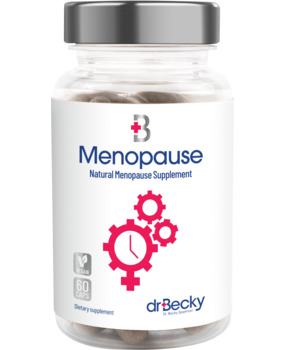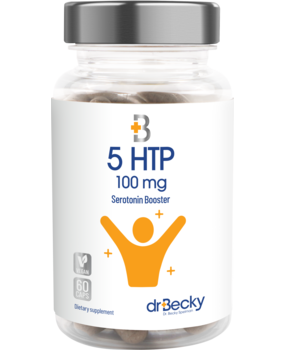Perimenopause
Menopause is a whole new phase in a woman's life
Menopause transition
The menopause is an entirely new phase in a woman’s life. As a child, your body develops towards puberty, when the body’s fertile period starts. You then have to get used to the menstrual cycle and all the physical inconveniences associated with it. When the production of fertility hormones decreases, a new phase begins. This phase is also accompanied by changes to the body and has an impact on your mental health. It can be a difficult time, but fortunately there are supplements that can help you to stay healthy and happy as you pass through this menopause transition.
Perimenopause vs. Menopause
We often use the term ‘menopause’ to describe the transition that takes place as a woman ceases to be fertile, including the changes she experiences leading up to her final period. In fact, the word ‘menopause’ refers specifically to the end of menstruation and pinpoints the time when you cease having periods. It’s not possible to predict in advance when your final period will take place. The timing of the menopause can only be determined by looking back, once you’ve definitely stopped having periods. The proper term for the transition phase from fertility to a woman’s last period is actually ‘perimenopause’. The menopause is the point marking the end of this transition, but the transition itself can take several years, as the body prepares for this new phase of life.
From menstruation to the menopause
What exactly does the menopause involve? To understand this, we need to go back to when a woman is born. At birth, she has millions of eggs, half of which have already disappeared by the time puberty starts. Then puberty begins and her body changes so that it is prepared for the possibility of pregnancy. The most important hormone involved in this is oestrogen. Oestrogen is produced in the ovaries. It helps to prepare the womb, facilitates ovulation and, in the event of fertilisation, plays an important role during the pregnancy. If nothing happens that month, then the production of oestrogen decreases and instead progesterone is produced to clean out the womb, through menstruation. And then the cycle begins all over again, continuing until all the eggs have been used up. The menopause transition starts when the eggs are almost finished and less oestrogens are produced to mature the eggs and prepare the womb for a possible pregnancy. When the eggs have all been used, then you have had your final menstruation and reached the point of menopause.
Hormonal fluctuations
Just like starting puberty, the menopause transition is accompanied by hormonal fluctuations. One month you may still have a heavy period following ovulation and the next hardly anything may happen, as no ovulation has taken place. It’s not unusual to have an irregular cycle as the menopause approaches. Just like when you started having periods, your cycle is confused. For example, you may suffer from PMS symptoms without having a period. This is because during the menopause transition the body has to find a new hormone balance, as it is producing far less oestrogens. This is very challenging for your body, but also for your state of mind. The menopause is a new period in your life that you have to get used to. Also, those hormonal fluctuations don’t help to keep you in a good mood.
Oestrogen is an important hormone
As your ovaries are scarcely producing oestrogens any more - they don’t need them any more now the eggs are finished - you notice this in your body. The fact is that oestrogen isn’t just important for maturing eggs - it’s also important for various organs and tissues and, in particular, for your bones. To make more oestrogens, your body puts your fat tissue to work, but this isn’t nearly as much as the amount that was produced by the ovaries. This is the reason why women have a greater likelihood of developing osteoporosis after the menopause. As your body tries to get used to the new balance, you may experience various inconvenient effects. These are referred to collectively as ‘menopause symptoms’.
Menopause symptoms
As each of us is different, every woman experiences the menopause in her own way. There are a number of menopause symptoms that you’re likely to encounter to some degree. Hot flushes are the one that gets mentioned most often. Hot flushes are sudden sweat attacks. You start to feel really warm for no reason and this makes you perspire. It’s a bit like a sudden fever spike. Hot flushes can occur during the day or at night, but then we call them night sweats. The sudden acceleration in circulation means hot flushes are often accompanied by heart palpitations. The best thing to do is to keep breathing steadily, so that the palpitations disappear more quickly. Other typical menopause symptoms include sleeping problems, often due to the night sweats, but also due to the changes in your hormone balance. Mood swings, less interest in sex, vaginal dryness, irregular periods (sometimes heavier, sometimes non-existent), PMS symptoms (painful breasts, period pain), weight gain and tiredness are also common menopause symptoms. Added to this, the menopause can cause osteoporosis, breast cancer and cardiovascular diseases.
Supplement to help with menopause symptoms
Going through the menopause is a perfectly normal process, but it’s possible to limit the extent to which you experience the inconveniences associated with it. Dr. Becky Menopause contains various extracts of wild yam, red clover, rhodiola rosea, common sage, camomile flower, lady’s mantle, monk’s pepper and pomegranate to support the body through the menopause transition. For example, by keeping the mucous membranes in good condition, reducing agitation and hot flushes, bringing hormone levels back into balance and maintaining your energy levels. Red clover flowers also contain phytoestrogens, which are similar to the sex hormone oestrogen. They help your body through the menopause. Incorporating various vitamins specifically suited to the menopause transition, this is an all-round supplement that can provide a great deal of support.
More information from Dr. Becky
The menopause transition can raise all kinds of new issues that you may have questions about. If your symptoms persist, you should consult your GP. But if you have any questions about the supplements then you can always ask Dr. Becky. We’ll be happy to help and advise you on how to get through the menopause more easily.
● Unique transition formula
● Can be used with HRT
● Helps with the psychological symptoms of menopause
● Promotes the production of serotonin
● Natural Griffonia seed extract
● Promotes Good Mood
● Female libido booster
● Helps increase sexual desire
● Natural ingredients
- Supplements for Mental Health
- Next Day Delivery
- High Quality Supplements
Overige categorieën in Menopause
Perimenopause
Menopause is a whole new phase in a woman's life
Menopause transition
The menopause is an entirely new phase in a woman’s life. As a child, your body develops towards puberty, when the body’s fertile period starts. You then have to get used to the menstrual cycle and all the physical inconveniences associated with it. When the production of fertility hormones decreases, a new phase begins. This phase is also accompanied by changes to the body and has an impact on your mental health. It can be a difficult time, but fortunately there are supplements that can help you to stay healthy and happy as you pass through this menopause transition.
Perimenopause vs. Menopause
We often use the term ‘menopause’ to describe the transition that takes place as a woman ceases to be fertile, including the changes she experiences leading up to her final period. In fact, the word ‘menopause’ refers specifically to the end of menstruation and pinpoints the time when you cease having periods. It’s not possible to predict in advance when your final period will take place. The timing of the menopause can only be determined by looking back, once you’ve definitely stopped having periods. The proper term for the transition phase from fertility to a woman’s last period is actually ‘perimenopause’. The menopause is the point marking the end of this transition, but the transition itself can take several years, as the body prepares for this new phase of life.
From menstruation to the menopause
What exactly does the menopause involve? To understand this, we need to go back to when a woman is born. At birth, she has millions of eggs, half of which have already disappeared by the time puberty starts. Then puberty begins and her body changes so that it is prepared for the possibility of pregnancy. The most important hormone involved in this is oestrogen. Oestrogen is produced in the ovaries. It helps to prepare the womb, facilitates ovulation and, in the event of fertilisation, plays an important role during the pregnancy. If nothing happens that month, then the production of oestrogen decreases and instead progesterone is produced to clean out the womb, through menstruation. And then the cycle begins all over again, continuing until all the eggs have been used up. The menopause transition starts when the eggs are almost finished and less oestrogens are produced to mature the eggs and prepare the womb for a possible pregnancy. When the eggs have all been used, then you have had your final menstruation and reached the point of menopause.
Hormonal fluctuations
Just like starting puberty, the menopause transition is accompanied by hormonal fluctuations. One month you may still have a heavy period following ovulation and the next hardly anything may happen, as no ovulation has taken place. It’s not unusual to have an irregular cycle as the menopause approaches. Just like when you started having periods, your cycle is confused. For example, you may suffer from PMS symptoms without having a period. This is because during the menopause transition the body has to find a new hormone balance, as it is producing far less oestrogens. This is very challenging for your body, but also for your state of mind. The menopause is a new period in your life that you have to get used to. Also, those hormonal fluctuations don’t help to keep you in a good mood.
Oestrogen is an important hormone
As your ovaries are scarcely producing oestrogens any more - they don’t need them any more now the eggs are finished - you notice this in your body. The fact is that oestrogen isn’t just important for maturing eggs - it’s also important for various organs and tissues and, in particular, for your bones. To make more oestrogens, your body puts your fat tissue to work, but this isn’t nearly as much as the amount that was produced by the ovaries. This is the reason why women have a greater likelihood of developing osteoporosis after the menopause. As your body tries to get used to the new balance, you may experience various inconvenient effects. These are referred to collectively as ‘menopause symptoms’.
Menopause symptoms
As each of us is different, every woman experiences the menopause in her own way. There are a number of menopause symptoms that you’re likely to encounter to some degree. Hot flushes are the one that gets mentioned most often. Hot flushes are sudden sweat attacks. You start to feel really warm for no reason and this makes you perspire. It’s a bit like a sudden fever spike. Hot flushes can occur during the day or at night, but then we call them night sweats. The sudden acceleration in circulation means hot flushes are often accompanied by heart palpitations. The best thing to do is to keep breathing steadily, so that the palpitations disappear more quickly. Other typical menopause symptoms include sleeping problems, often due to the night sweats, but also due to the changes in your hormone balance. Mood swings, less interest in sex, vaginal dryness, irregular periods (sometimes heavier, sometimes non-existent), PMS symptoms (painful breasts, period pain), weight gain and tiredness are also common menopause symptoms. Added to this, the menopause can cause osteoporosis, breast cancer and cardiovascular diseases.
Supplement to help with menopause symptoms
Going through the menopause is a perfectly normal process, but it’s possible to limit the extent to which you experience the inconveniences associated with it. Dr. Becky Menopause contains various extracts of wild yam, red clover, rhodiola rosea, common sage, camomile flower, lady’s mantle, monk’s pepper and pomegranate to support the body through the menopause transition. For example, by keeping the mucous membranes in good condition, reducing agitation and hot flushes, bringing hormone levels back into balance and maintaining your energy levels. Red clover flowers also contain phytoestrogens, which are similar to the sex hormone oestrogen. They help your body through the menopause. Incorporating various vitamins specifically suited to the menopause transition, this is an all-round supplement that can provide a great deal of support.
More information from Dr. Becky
The menopause transition can raise all kinds of new issues that you may have questions about. If your symptoms persist, you should consult your GP. But if you have any questions about the supplements then you can always ask Dr. Becky. We’ll be happy to help and advise you on how to get through the menopause more easily.




